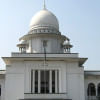HC slams BSTI for inaction against unlicensed milk, curd producers
The High Court today expressed serious astonishment and dissatisfaction at the Bangladesh Standards and Testing Institution’s statement which said it (BSTI) has no responsibility about the companies and dairy farms which have no license for producing and supplying pasteurised milk and curd.
“We are astonished at your statement. Who has given you the right to play ducks and drakes with the people’s health? They have no license, but they are producing and supplying milk! Who is responsible for looking into it?” the HC bench of Justice Md Nazrul Islam and Justice KM Hafizul Alam said during hearing a suo moto rule.
The bench made the comment to BSTI’s lawyer Barrister Sarkar MR Hassan and Deputy Director Nurul Islam as they told the court that BSTI looks into the matters of only 18 companies which were given license for producing and supplying pasteurised milk and curd.
Barrister Sarkar MR Hassan said the Directorate of Agriculture Extension and the Ministry of Livestocks and Fisheries are responsible for taking steps about the companies which have no license for producing and supplying pasteurised milk and curd.
Anti-Corruption Commission’s lawyer Advocate Syed Mamun Mahbub and Deputy Attorney General AKM Amin Uddin Manik opposed this statement and said the BSTI has been given powers in the law to take action against the companies and dairy farms which have no license for producing and supplying pasteurised milk and curd.
The BSTI is diverting the responsibility to others, they said, adding that the court needs to be rigid on this issue.
The BSTI lawyer requested the court to pass an order for destroying the pasteurised milk and curd produced and supplied by the unregistered companies and dairy farms.
The court said the lawyer made a contradictory statement as he earlier said BSTI is not responsible over the companies which have no license for producing and supplying milk and curd.
The HC bench ordered the BSTI to submit a report to it in two weeks containing the names and particulars of the companies and firms that are producing and supplying milk and curd in Dhaka without having any license.
It also asked the BSTI to include in the report the names and particulars of the companies and firms producing and supplying milk and curd with a valid license.
The HC bench also asked the organisations concerned of the government not to disturb Prof Shahnila Ferdousi, head of National Food Safety Laboratory (NFSL), over its study report.
The NFSL, in the study report, said it found the presence of excessive levels of lead and pesticides in raw cow milk, regular consumption of which may pose threats to human health.
The study also found a high level of chromium in fodder and excessive presence of pesticides, antibiotics and bacteria in raw cow milk.
Prof Shahnila’s lawyer Barrister Shahin Ahmed today told the court that a few government organisations had disturbed and pressed her for the names of the companies producing adulterated raw cow milk and curd and about the systems of her research.
Prof Shahnila was present in the courtroom during the hearing of the rule today.
Earlier in the day, the BSTI submitted a report to the HC saying that it has tested 305 samples of curds from across the country and found 303 samples standard and found only two samples from Dhaka and Sylhet substandard.
Meanwhile today, Bangladesh Food Safety Authority’s lawyer Barrister Mohammed Faridul Islam sought four weeks’ time from the HC to submit the report on the companies and the individuals responsible for the adulteration of milk, curd and fodder, saying that his client is yet to collect the reports from the laboratories concerned.
The court directed BFSA to submit the report before it by July 15.
Earlier on May 15, the HC bench had ordered the BFSA to submit the report to it by today.
On that day, (May 15), the bench had issued a serious warning saying that the companies and individuals responsible for adulterating milk and curd, whoever they were, would not be spared and they must be punished.
None will be allowed to play ducks and drakes with people’s lives and health, as safe food is a fundamental right of people, the court said, asking, “How will the nation be built if health of its future generation is not sound?”
The BFSA on May 8 submitted a test report to the HC and said it found harmful elements in most of the 190 samples of raw and packed liquid milk, curd, and fodder. The samples were tested at the NFSL.
Issuing the suo moto rule, the HC bench on February 11 had directed the ACC to enquire about the adulteration of milk, curd, and fodder and take legal action against those responsible.
The court also asked the BFSA to form a probe committee to identify in three months the individuals and businesses involved in adulteration of dairy products and fodder.
The HC then issued a rule asking the respondents, including the BFSA chairman, members of Central Food Safety Management Coordination Committee and the BSTI chairman, to explain why their inaction and failure in preventing adulteration and taking appropriate legal steps against it should not be declared illegal.
It asked them to show causes as to why the production, carrying, and preservation of adulterated milk, curd, and fodder in shops, departmental stores, and the open market should not be declared illegal.
The rule asked the respondents to explain why they should not be directed to remove those from market and bring people responsible to book.
The HC bench came up with the order and rule following reports on adulteration published in The Daily Star, the Prothom Alo, and the Kaler Kantha on February 11.

 For all latest news, follow The Daily Star's Google News channel.
For all latest news, follow The Daily Star's Google News channel. 








Comments